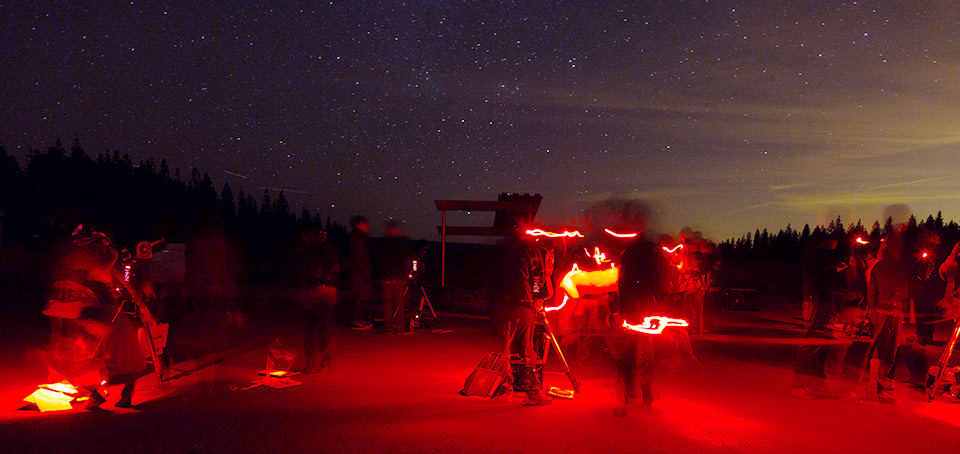
Contact Information

- Division
- Sciences and Mathematics
- Dean
- Randy Lehr
- Associate Dean
- Karen Warburton

- Division Office
- V 211, Rocklin Campus
Overview
The Astronomy curriculum introduces students to basic topics such as the characteristics of the Solar System, the nature of the sun and other stars, the galaxy we exist in, its extent and evolution.
Several different level courses are presented in a multi-mode instructional fashion--for example, multi-media, planetarium presentations and laboratory and field experiences. Special emphasis is placed on the understanding of observable celestial phenomena and events familiar to the individual’s natural environment. The program is not designed to prepare students for Astronomy majors and does not presume extensive backgrounds in science and mathematics.
Faculty
David E. Dunn
Professor, Astronomy
B.S., University of California, Davis
M.S., University of Iowa
Ph.D., University of Iowa
Barry A. Rice
Professor, Astronomy
B.S., Rensselaer Polytechnic Institute
Ph.D., University of Arizona
Courses
Understanding course descriptions
ASTR 0002. Introduction to Planetary Systems
Units: 3
Advisory: Completion of ENGL N with grade of "C" or better
Hours: 54 lecture
General principles and fundamental facts of astronomy associated with planetary systems. Includes historical developments of planetary astronomy, basic principles of planetary system observations and analysis, and general concepts for interpreting the night sky with charts and almanacs. Particular detail given to the formation, evolution, and current condition of the Sun and Solar System, as well as current knowledge of other planetary systems. (CSU, UC)
ASTR 0005. Introduction to Stars, Galaxies, and the Universe
Units: 3
Advisory: Completion of ENGL N with grade of "C" or better
Hours: 54 lecture
General principles and fundamental facts of astronomy emphasizing stars, galaxies, and the universe. Includes historical developments of astronomy, basic principles of astronomical observations and analysis, and general concepts for interpreting the night sky with charts. Particular detail given to structure and evolution of stars, general characteristics of deep sky objects (star clusters, nebulae, and galaxies), large-scale structure of the Universe, and cosmology. (CSU, UC)
ASTR 0007. Life in the Universe
Units: 3
Formerly known as INT 11
Hours: 54 lecture
Study of the emerging discipline of astrobiology. Designed for science and non-science majors. Relevant principles of biology, astronomy, and earth science used in searching for life in the universe. Includes cultural and philosophical implications of life existing elsewhere in the universe. (CSU, UC)
ASTR 0010. Elementary Astronomy
Units: 3
Advisory: Completion of ENGL N with grade of "C" or better
Hours: 54 lecture
General principles and the fundamental facts of astronomy. Includes historical developments of astronomy, the formation, evolution and current condition of sun and solar system, stellar structure and evolution, deep sky objects (star clusters, nebulae, galaxies), structure of universe, and cosmology. Not open to students who have successfully completed both ASTR 2 and ASTR 5. (CSU, UC)
ASTR 0011. Observational Astronomy
Unit: 1
Prerequisite: Completion with grade of "C" or better or concurrent enrollment in ASTR 2, 5, or 10
Advisory: Completion of ENGL N with grade of "C" or better
Hours: 54 laboratory
Basic interpretation of astronomical observations through telescopes, binoculars, computers, cameras, and other simple measuring equipment. Use of planetarium to facilitate recognition of constellations, stars, planetary motions, and study coordinate systems and celestial motions. Development of observational skills to study outdoor sky and outcomes of indoor laboratory experiments. Emphasis on quantitative and qualitative analysis of variety of astronomical data. (CSU, UC)
ASTR 0014. Astrophotography and Imaging
Unit: 1
Prerequisite: Completion with grade of "C" or better or concurrent enrollment in ASTR 2, 5, or 10
Advisory: Completion of ENGL N with grade of "C" or better
Hours: 54 laboratory
Basic principles and practices of astrophotography and image processing. Astronomical observations and data collection associated with the use of telescopes, binoculars, computers, cameras, and other related equipment. Development of observational techniques and data analysis procedures for the study of the outdoor sky with related indoor experiments and studies. Particular emphasis placed on quantitative and qualitative analysis of a variety of astronomical data collected with cameras. NOTE: About 5 nights of activities will be required. (CSU, UC)
ASTR 0025. Frontiers in Astronomy
Units: 3
Prerequisite: Completion of ASTR 5 or 10 with grade of "C" or better
Hours: 54 lecture
Topics at the forefront of astronomical research including an in-depth look beyond introductory astronomy. Emphasis on theoretical principles and supporting observational data. Includes relativity and warped spacetime, black holes, dark matter, quasars, gravitational waves, grand unified and super symmetry theories, and other recent developments in cosmology. (CSU, UC)
ASTR 0028. Independent Study
Units: 1-3
Designed for students interested in furthering their knowledge at an independent study level in an area where no specific curriculum offering is currently available. Independent study might include, but is not limited to, research papers, special subject area projects, and research projects. See Independent Study page in catalog. (CSU, UC-with unit limitation)
Program Student Learning Outcomes (PSLOs)
- Demonstrate knowledge and skill in Observational Astronomy, correlating the observable sky to events in the cosmos.
- Explain knowledge and skill in Celestial Navigation, evaluating the significance of important astronomical phenomena.
- Operate a variety of Optical Systems, demonstrating proficiency in their use.
- Use various Imaging Systems to produce high quality image data products, demonstrating overall mastery of image reduction skills.
- Analyze basic science and core physics, to discover how they apply to astronomy.
- Use concepts from planetary astronomy to investigate the types of different planetary classes and other objects in the solar system.
- Develop an understanding of solar physics - the sun's method of energy production, its anatomy, solar phenomena, and life history.
- Relate core concepts in basic science to stellar astronomy, assessing the various factors that are important to stellar evolution.
- Synthesize information from various sources (classroom instruction, online resources, etc.) to produce a coherent understanding of galactic/extragalactic astronomy.
- Evaluate concepts in cosmology, relating concepts in underlying physics and observations to scientific frameworks of our universe's formation and evolution.
- Critique new findings in the frontiers of astrophysics, assessing and appraising their conceptual frameworks.
- Investigate astrobiology, and relate concepts of life, evolution, and the universe to what can be observed.



